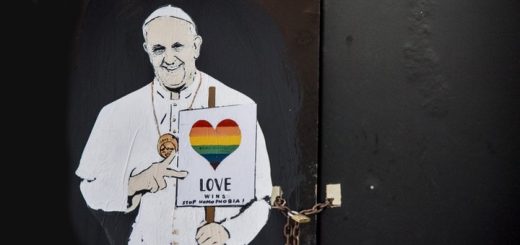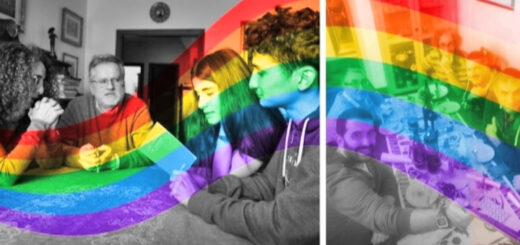Catholics LGBT+ A Hong Kong. If we talk, will we be listened to in the Catholic Church?
Reflections by Yip Lai Shan*, published in the book "BLESSED Are Those Who Mourn: Chinese Tongzhi Catholics' Tales"(Blessed are those who cry: tales of Chinese Tongzhi Catholics) edited by Eros Shaw, Mark Larrimore and Michael Clifton, Editore Sird (Malaysia), 2022, pp.265-280. Freely translated by the volunteers of the Gionata project
Writing these reflections is not easy for me, because my study focuses on postcolonial and queer criticism. The scholar Gayatri Chakravorty Spivak, in his work on postcolonialism, faced the concept of "otherness", that is, the way the colonizers built an image of the local inhabitants as inferior, undermining their self -esteem and social position. Faced with this injustice, Spivak asked a powerful question: "Can subordinates speak?" This reflection opens an important question on the subjectivity of marginalized people.
Starting from this perspective, I want to expand the speech to the subjectivity of homosexual people, in particular in the context of the Catholic Church in Hong Kong. The official documents of the Catholic Church on sexuality do not consider the influence of colonialism. Although the Federation of Asian Bishops' Conferences (FABC) has often spoken of the importance of inculturation, the specific impact of colonialism on sexuality has never been addressed directly. A postcolonial criticism could offer an essential reading key to understanding the teachings of the Catholic Church on sexuality, developed within a mainly European historical context.
The pastoral principle of respect for human subjectivity
Cardinal John Tong, of the Catholic Diocese of Hong Kong, spoke of subjectivity in his pastoral letter of 29 September 2014, published on the eve of Synod of the bishops on the subject Proclaim and live the Gospel of the family. In this letter, he outlined three fundamental principles for pastoral care:
- Be compassionate companions.
- Remain in line with the teaching of the Church.
- Identify the causes of confusion concerning Catholic doctrine.
By explaining the first principle, the cardinal writes:
"The Church and its shepherds must have a heart listening to reach each person with concern, love and compassion, treating it as a subject and not as a simple object of pastoral care. They must not judge or condemn, but respect the person's freedom and dignity, accompanying it on the difficult path towards a full life. The Church must develop a sensitivity that allows her to grasp and even respond to the silent cry of every heart."
This principle should also apply to pastoral care for homosexual people.
Contradictions in pastoral care for LGBTQI+ people
However, the pastoral letter also states that the accompaniment of people with "attraction for the same sex" must take place in compliance with Catholic doctrine, which considers homosexual acts sinful. For most LGBTQI+Catholics, this is not new. The problem arises when these people, although unable to repress their desire for love, meet someone with whom they can build a relationship based on mutual support.
At this point, the question becomes: How can pastoral accompany them respecting both their subjectivity and teaching the Church?
In addition, the letter also speaks of children with gender dysphoria, stating that late treatment could lead to the development of a "homosexual inclination" and suggesting to carefully evaluate the effectiveness of therapies. But who takes into account the voice of those who live this experience firsthand? Is their subjectivity listened to?
If LGBTQI+ people seem silent, what is their inner cry? Are we able to hear it? Or do we choose to ignore it?
Epistemological violence and imposed silence
In the Catholic Church in Hong Kong, the voice of LGBTQI+people rarely feels. This also happens in China, Macao and Taiwan. It is a rare event that some LGBTQI+ Catholics have accepted to share their experience in the book BLESSED Are Those Who Mourn: Chinese Tongzhi Catholics' Tales (Blessed are those who cry: tales of Chinese Tongzhi Catholics, 2022).
In the 1980s, the diocese of Hong Kong supported the decriminalization of homosexuality and, in the 90s, did not openly oppose a law against discrimination based on sexual orientation. However, from 2004 onwards, its position stiffened, as demonstrated by the pastoral letter of Cardinal Tong and its guidelines for the 2015 elections, which clearly opposed this legislation.
Since 2003, a group of LGBTQI+ Catholics has started to make its voice heard in the media, fighting for the approval of laws against discrimination. But most of them remain silent. The fear of stigmatization and repression has created a sort of "epistemological violence", as Spivak defines it: a mechanism that marginalize and shuttles LGBTQI+people.
From stigmatization to freedom of speech
Declaring LGBTQI+ is an act of awareness, exploration and self -acceptance. This is not just a sexual identity, but a path in which his voice is affirmed in society.
Many authors of the book BLESSED Are Those Who Mourn: Chinese Tongzhi Catholics' Tales (Blessed are those who cry: tales of Chinese Tongzhi Catholics, 2022) are no longer identified with terms imposed from the outside, as "people with attraction for the same sex", but prefer the term "gay" to underline their subjectivity and reaffirm to be created in the image of God.
Their stories tell not only acts, but authentic feelings, real relationships, justice and profound faith. They are rumors that emerge from a system dominated by the interrogation.
Conclusion: What future for LGBTQI+Catholics?
The book publication BLESSED Are Those Who Mourn: Chinese Tongzhi Catholics' Tales (Blessed are those who cry: tales of Chinese Tongzhi Catholics, 2022) is a precious testimony. But the question remains: Will the Catholic Church be willing to really listen to these voices?
Pope Francis, in apostolic exhortation Amoris Laetitia, he stressed that applying moral law rigidly without considering concrete situations would be like "launching stones" against people. What the Church is called to do is accompany, listen and understand.
For a long time, the natural law applied to LGBTQI+ people was presented as a rigid and immutable code, rather than a source of spiritual inspiration. Now it has been time that LGBTQI+ people become active subjects in theological and moral dialogue.
They no longer have to live in the shadow of shame or in the isolation imposed. The path to holiness is not covered with silence, but with the freedom of being yourself before God.
* Yip Lai Shan is PhD student at the Graduate Theological Union of the University of California (United States)
Original text: LGBTQI+ Catholics in Hong Kong—IF We Speak Out, Will We Be Listened to?






